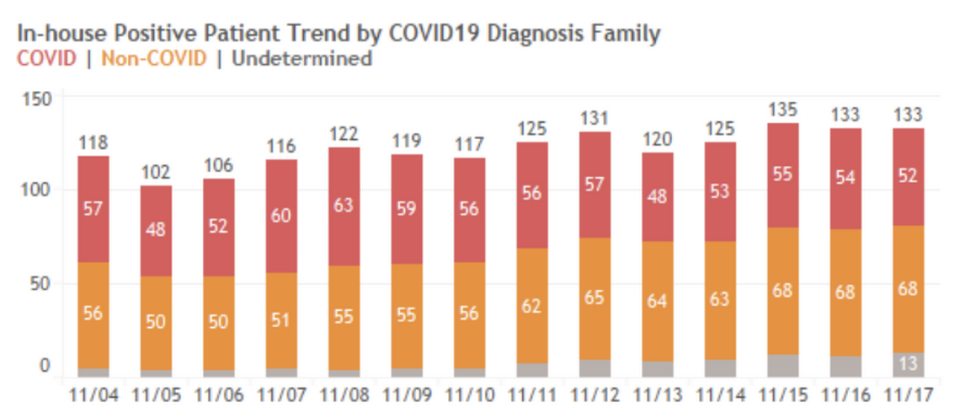In Miami, a sign of widespread transmission: More non-COVID patients have the virus
Over the last week, 898 patients at Miami’s public hospitals tested positive for the novel coronavirus, but more than half of them — 471 — were admitted for other reasons, largely to emergency rooms, without typical COVID-19 symptoms.
Public health experts say it’s yet another indicator of increasingly widespread transmission of the virus in Miami-Dade County, as the virus ramps up across the country. Vicky Perez, a nurse and the director of critical care at Jackson North Medical Center, said she’s seen it in growing numbers: Patients who show up for anything from a car accident to abdominal pain are later testing positive for the SARS-CoV-2 virus that causes COVID-19.
“They’re in the community. They’re working. They’re going to restaurants, and they don’t know they have it,” Perez said. “That’s why it’s so important to wear a mask, stay six feet apart, and don’t go out unless we have to.”
The number of non-COVID patients testing positive has been climbing for more than a week and comes on the heels of worsening coronavirus metrics for Miami-Dade and South Florida in general. A spokeswoman for Memorial Healthcare System in Broward County said the hospital network was seeing a similar uptick in non-COVID patients showing up at hospitals with the virus.
In Miami, hospitalizations specifically for COVID-19 have been accelerating this week after more than a month of other troubling signs: The number of daily reported cases and percentage of people testing positive has risen sharply over the month of November, representing a delayed fall resurgence of the virus that is picking up across the country.
“It’s one more piece of information that indicates community transmission of COVID-19 is increasing,” said Mary Jo Trepka, an infectious disease epidemiologist and professor at Florida International University. “We also have the case numbers, which are pretty hard to ignore at this point.”

After averaging about 500 cases a day for much of October, Miami-Dade has seen its daily case counts break 1,000 eight times over the last two weeks. Trepka noted that the median age for those cases has skewed younger, which would explain why hospitals haven’t seen as much of a surge in admissions yet.
But Miami’s hospitals are reporting more COVID patients than they have since early September, when the healthcare system was still recovering from the summer surge that overwhelmed it.
‘We’re in another surge’
When Perez, the nurse at Jackson North, returned to work on Monday, she could tell that COVID had worsened, with more patients coming through the door.
“I noticed that we were in another surge,” Perez said on Wednesday morning.
Perez said that Jackson North is treating about four times as many patients in the intensive care unit where she works, but the hospital is still significantly under capacity. Perez said they would ramp up as needed, but the increased burden is already affecting healthcare workers who had a couple of months to rest after a grueling summer.
“We do have a plan,” Perez said. “But you can tell the change from having one or two [patients] for the last four weeks and now this whole week we’ve had eight to 10.”
Trepka, the epidemiologist, said that severe illness in Miami-Dade is still tracking behind cases and testing. She said she expected the surge to continue to worsen and pointed out that the number of people in ICUs and on ventilators has risen more sharply in Broward and Palm Beach counties.
Those counties, she added, started to see upticks in transmission a couple of weeks before Miami.
“It looks like that is what we’re going to see here shortly,” Trepka said.

